ГИГИЕНЕ-САНИТАРНЫЕ МЕРЫ ПО ПРОФИЛАКТИКЕ И БОРЬБЕ С ПОСЛЕДСТВИЯМИ ПАНДЕМИИ COVID-19
Защити себя! Избегайте прямого контакта!
Избегайте людных мест, где вы подвергаетесь прямому контакту и/или взаимодействию с большим количеством людей, общественных собраний, очередей, зон движения, зон отдыха.
Максимально ограничьте любые прямые контакты с другими людьми, такими жестами, как: рукопожатия, целование руки или целование щек, касаясь лиц руками.
Не прикасайтесь к поверхностям, к которым часто прикасаются другие люди, таким как поручни, дверные ручки, ручки лифта и кнопки доступа. Если вам придется прикоснуться к этим поверхностям, защитите себя салфетками.
Держитесь на значительном расстоянии 2 метра от людей, с которыми вы встречаетесь. Если вы пользуетесь общественным транспортом, старайтесь НЕ стоять лицом к лицу с другими людьми.
Убедись что вы продезинфицировали руки перед тем, как прикоснуться к лицу, носу или рту, после того, как вы воспользовались общественным транспортом.
Используйте маршруты или альтернативные виды транспорта, насколько это возможно, чтобы избежать людных мест (чтобы избежать переполненных областей). Если программа позволяет, используйте периоды низкой посещаемости. Для небольших расстояний используйте альтернативные виды транспорта: велосипед/самокат или пешком.
Ограничьте использование наличных денег и монет, выбрав оплату кредитной картой/смартфоном или онлайн-платежами. Используйте маску для лица/хирургическую маску. Маска для лица должна полностью закрывать нос и рот человека который ее носит.
Мойте руки водой с мылом не менее 20 секунд после любого контакта с потенциально загрязненной поверхностью.
Используйте бумажные полотенца, чтобы вытереть руки.
Не прикасайтесь к глазам, носу или рту, если у вас грязные руки.
Если вы чихаете и кашляете, прикрывайте рот и нос салфеткой и после использования выбросьте ее в мусорное ведро.
Часто дезинфицируйте поверхности с которыми вы соприкасаетесь, спиртом или раствором хлора как дома, так и на факультете.
Проветривайте несколько раз в день помещение, в котором вы занимаетесь своими делами.
Не пейте из одной бутылки/стакана с другими людьми и не пользуйтесь одними и теми же столовыми приборами.
Не имейте прямого контакта с людьми которые изолированы дома, даже если у них нет специфических симптомов коронавируса. Вирус могут распространять и внешне здоровые люди, которые не знают, что являются его носителями.
Оставайтесь дома/в студенческом общежитии если у вас есть симптомы гриппа или простуды (кашель, лихорадка, затрудненное дыхание). В экстренных случаях звоните 112! Желательно оставаться дома и дождаться перевода в стационар, который будет организован с соблюдением всех мер безопасности изоляции.
HYGIENE AND SANITARY MEASURES TO PREVENT AND COMBAT THE EFFECTS OF THE COVID-19 PANDEMIC
Protect yourself! Avoid direct contact!
Avoid crowded areas where you are exposed to direct contact and/or interacting with numerous people, public gatherings, queues, traffic areas, recreational areas.
Limit any direct contact with other people to the maximum, by gestures such as: handshaking, hugs, hand-kissing or kissing the cheeks, touching faces with hands.
Avoid touching surfaces that are frequently touched by other people like handrails, doorknobs, handles, elevator and access buttons. In case you have to touch these surfaces, protect yourself by using tissues.
Keep a significant distance of 2 meters from the people you meet. In case you use public transport, try NOT to stand face-to-face with other people.
Make sure that you have sanitized your hands before you touch your face, nose, or mouth, after you have used the public transport.
Use routes or alternative means of transport as far as possible to avoid crowded areas. In case the program allows, use low-traffic periods. For small distances, use alternative means of transport, either by bicycle / electric kick scooter or by foot.
Limit the use of cash and coins, choosing to pay by credit card/smartphone or online payments.Use the face mask / surgical mask. The face mask must completely cover the nose and mouth of the person who wears it.
Wash your hands with water and soap for at least 20 seconds after any contact with a potentially contaminated surface.
Use paper towels to wipe your hands.
Do not touch your eyes, nose, or mouth if your hands are not clean.
If you sneeze and cough, cover your mouth and nose with a tissue and throw it in the bin after use.
Frequently disinfect the surfaces you come in contact with, with alcohol or chlorine solution, both at home and at the faculty.
Ventilate multiple times a day the room in which you carry out your activities.
Do not drink from the same bottle / glass with other people and do not use the same cutlery.
Do not have direct contact with people who are isolated at home, even if they do not have specific coronavirus symptoms.The virus can be also spread by seemingly healthy people who do not know that they carry it.
Stay home/at the student dormitory if you have flu or cold symptoms (cough, fever, difficulty in breathing). In case of emergency, call 112! It is preferable to stay at home and wait for the transfer to the hospital to be organized in compliance with all isolation safety measures.
Admission requirements for EU candidates
Citizens of the European Union, European Economic Area (Norway, Iceland and Liechtenstein) and Switzerland who apply for admission to the Romanian education system must meet the same conditions as Romanian citizens and have the same tuition fees as Romanian students.
The recognition of studies is done by the National Centre for Equivalence and Recognition of Diplomas.
Submitting documents for enrolling at Undergraduate medical studies
The conditions of admission to studies by evaluating the school performance and personal achievements for citizens of the Member States of the European Union, of the States belonging to the European Economic Area and of the Swiss Confederation
Citizens of European Union member states, from the European Economic Space and of the Swiss Confederation are admitted by evaluating the school performance and personal achievements after their school studies have been recognized.
The study recognition is done by the National Centre for Recognition and Equivalence of Diplomas.
Admitted candidates by file evaluation can study based on tuition fee on the entire study period.
The file evaluation of the candidates is done by a committee constituted at the faculty’s level, which will analyse the documents within the candidate’s file.
After the evaluation procedure, the files, which are eligible, are sent for recognition to the National Centre for Recognition and Equivalence of Diplomas. After the files are evaluated by the National Centre for Recognition and Equivalence of Diplomas, a certificate is issued which gives the candidate the right to attend university studies in Romania.
However, candidates who follow the admission exam criteria may be admitted under the same conditions as Romanian candidates. See links:
- Criteria for the admission exam at undergraduate full-time studies – year 2020 (link in Romanian)
- Submitting documents for enrolling at undergraduate studies for EU candidates
Selection criteria:
1. Taking the high school exam (baccalaureate examination) in biology or chemistry, or
2. Graduating an accredited high school in the country of origin that has biology or chemistry in the discipline curriculum, or
3. The minimum grade of the high school exam (baccalaureate examination) must be at least 70% of the theoretical maximum grade of the exam in the country in which the candidate graduated high school;
4. Proof of knowing the Romanian language (Romanian Language Certificate);
5. C.V. with experience and skills in the field of medicine and pharmacy or related;
https://europass.cedefop.europa.eu/editors/ro/cv/compose
6. Letters of recommendation or proof of voluntary activities in the medical-pharmaceutical or related fields
Required documents:
1. Application form, the candidate's commitment, as well as the consent statement regarding the processing of personal data, filled in entirely;
2. CV Europass in Romanian signed each page.
3. Baccalaureate (High school) diploma or equivalent – 2 copies conformed to original and 2 certified translations.
Original diplomas from Italy, Greece, Spain, Portugal and Cyprus will have the Hague Apostille.
Original diplomas issued in states that are not part of the Hague Convention Apostille will be authenticated by:
a. the Ministry of National Education and the Ministry of Foreign Affairs from the issuing country, the Embassy/ the Consular Office of Romania in the issuing country and by the Ministry of Foreign Affairs of Romania or by;
b. the Ministry of National Education from the issuing country, the Embassy/ the Consular Office of the issuing country in Romania and by the Ministry of Foreign Affairs of Romania.
The certificate of passing the Baccalaureate from Italy, Pruebas de Aptitud para el Acceso a la Universidad, calificación Apto from Spain and the certificate for the national exams for general high school (Panellinies Exetaseis) from Greece will have the Hague Apostille.
4. Academic records for all the high school years (classes 9 – 12/13) and for the Baccalaureate (High school) exam - 2 copies conformed to original and 2 certified translations of each original document.
5. Personal ID document – copy; passport (valid at least 6 months from the time of submitting the file) – copies conformed to original of pages 1, 2, 3, 4 or another ID document proving the citizenship of a member state of the European Union, the European Economic Area or the Swiss Confederation;
6. Birth certificate – 2 copies conformed to original;
7. Medical certificate to attest that the person who is going to enrol at studies does not suffer from contagious diseases or other conditions incompatible with the future profession and did not contract or is not infected with SARS-COV2 – copy according to the original and certified translation of the original document.
8. Receipt of payment the file evaluation fee – 50 euros – 1 copy conformed to original;
9. Romanian Language Certificate – 1 copy conformed to original;
10. Application form for equivalence the high school diploma obtained abroad. (Application forms – Annex 1) the equivalence certificate of the diploma if it exists
11. 3 ID photos;
12. Letter of recommendation or proof of voluntary activities in the medical-pharmaceutical or related fields – copies conformed to original and certified translation of the original document.
Location:
Registrations are made at the university headquarters, General Directorate Secretariat, room 89, according to the admission calendar or online at This email address is being protected from spambots. You need JavaScript enabled to view it.. (location)
- Application form for Free Movers
- Learning Agreement for Free Movers
- Changes to the Learning Agreement for Free Movers
- Accommodation form for Free Movers
Additional information
 Professor Carmen MORARU, PhD, (class of 1989) was chosen Fellow at Institute of Food Technologists in the USA
Professor Carmen MORARU, PhD, (class of 1989) was chosen Fellow at Institute of Food Technologists in the USA
Ambassador of the Faculty of Food Science and Engineering at “Dunarea de Jos” University of Galati, Professor Carmen MORARU, PhD, is among the 12 members of the Institute of Food Technologists in the USA - the largest and one of the most reputable organizations professional-scientific profile in the world - who will be awarded the title of "Fellow" this year.
For Professor Carmen MORARU, PhD, the title of IFT Fellow is awarded for recognizing her important contributions in food science and engineering and in the development of modern methods of athermic food processing, aiming at their quality and safety, but also an activity teaching superlatively evaluated by the students and doctoral students she leads, as well as to promote advanced principles in the field of food engineering.
Carmen MORARU graduated in 1989 the Faculty of Faculty of Food Technology and Chemistry and Fisheries Technique (the former name of the Faculty of Food Science and Engineering), Milk – Meat study program, as valedictorian. After a short period in which she worked as a technological engineer at the Tecuci and Galati Milk Industrialization Enterprise, she became a faculty member as an assistant (1991 - 1996) and senior lecturer (1996 - 1999), during which time she did her doctoral studies under the coordination of the distinguished professor G.M. Costin. Her teaching career continued at Rutgers University (New Brunswick, NJ, USA) where she worked between 1999 and 2003 as a postdoctoral fellow and then as a research assistant professor. Since 2003 she has been working at Cornell University (Ithaca, NY, USA), where she is now a professor and Chair of the Department of Food Science. In 2019, Professor Carmen MORARU, PhD, received the Doctor Honoris Causa distinction at the University of Agronomic Sciences and Veterinary Medicine of Bucharest. Carmen MORARU gave several lectures for students, PhD students and professors of the Faculty of Food Science and Engineering, participated in joint research programs with professors from our Faculty, and funds the special award Prof. G.M. Costin for the doctoral students of the Faculty of Food Science and Engineering, for the scientific contributions presented at the Annual Conference of the Doctoral Schools.
The research of Professor Carmen MORARU, PhD, aims at processing methods that can improve the safety, quality and durability of food use, investigating in particular the intermolecular interactions and structural transformations that occur during processing, separation through membranes, light pulse treatment and the use of nano-topographies in the development of germophobic surfaces. The rich scientific activity of Professor Carmen MORARU, PhD, includes 63 articles published in prestigious scientific journals, with over 3,800 citations and the Hirsch index of 29, 11 books and chapters of specialized books, 88 presentations as guest speaker and over 150 papers at various conferences and workshops in the USA, but also China, India, Brazil and many European countries. She has supervised 7 postdoctoral students, 14 doctoral students and 19 master's students, and over the years her teaching activity has been appreciated by four awards for excellence in teaching, awarded by Cornell University and the International Dairy Foods Association. She also gave more than 20 lectures in the dissemination of science and research for the industry.
Professor Carmen MORARU, PhD, represents for the Faculty of Food Science and Engineering a professional model of the professor and researcher in academic education, which confirms the value of the school where she was educated.
 Elena-Alexandra ONICIUC
Elena-Alexandra ONICIUC
Elena-Alexandra ONICIUC is a 2012 graduate of the Faculty of Food Science and Engineering I Dunarea de Jos University of Galati. She became a PhD in Industrial Engineering in 2017, under the joined supervision of Prof. Eng. Anca Ioana Nicolau, PhD, and Prof. Vet. David Rodriguez Lazaro, PhD (The University of Burgos, Spain). Her research dealt with the methylcilino-resistant Staphylococcus aureus strains isolated in food products.
The University of Burgos, on the University Day, awarded all promising PhDs with notable results in 2017. The prizes were awarded on March 2nd 2018 in Burgos, Spain, and the Galati native was among the winners.
At present, Elena-Alexandra ONICIUC is working on risk assessment in antibiotic resistance along teh foodchain, as a member of the research team coordinated by Prof. Eng. Anca Ioana Nicolau, PhD - ERA-IB SafeFood (Development of a novel industrial process for safe, sustainable and higher quality foods, using biotechnology and cybernetic approach), as well as SafeConsumE.

Iuliana Aprodu has a Bachelor degree in Food Science and Engineering from “Dunarea de Jos” University of Galati (2002). Following her graduation she started an academic career in our university. She was awarded a PhD title in Bioengineering from Politecnico di Milano (2008). She has been involved in a large number of international collaborations and research projects, which have brought her great results and international visibility. She is a pioneer in Romanian research to combine laboratory experimental methods within silico approach to investigate unimolecular processes. In 2013 Iuliana was awarded a Postdoctoral Senior Fulbright Research Fellowship at Cornell University, 14th in the world according to one of the international university rankings. During her six-month stay in the US, Iuliana dealt with structural and functional investigations of non-traditional, emerging food proteins.Today she continues working in our university, sharing her knowledge, expertise, ambitions and orientations for the future with students and young researchers. (01.05.2015)
 BĂRZOI Elena Cristina
BĂRZOI Elena CristinaDepuis la fin de ma licence en Langues Modernes Appliquées (français et anglais) en 2010, je travaille pour le centre d'appel WEBHELP ROUMANIE, le premier employeur francophone de Roumanie, opérateur international en Gestion de la Relation Clients avec plus de 2000 collaborateurs sur ses six sites de Bucarest, Ploiesti, Iasi et Galati. Aujourd'hui j'y suis conseiller clientèle. La licence en Langues Modernes Appliquées m'a permis d'achever une formation complexe, pluridisciplinaire, qui combine l’étude de deux langues étrangères avec des enseignements en sciences du langage et communication, sciences économiques et sociales, en droit, en informatique. En outre, j'ai eu l'occasion d'acquérir des connaissances de linguistique avec une excellente connaissance de la civilisation et de la culture des pays francophones. Comme je m'intéressais au monde de l’entreprise, j'ai pu apprendre des savoir-faire qui me sont utiles aujourd'hui dans ma vie professionnelle. Pendant mes études universitaires, j'ai participé aux concours de traductions et aux conférences organisés au sein de la Faculté des Lettres International Conference on Translation Studies: Retrospective and Prospective Views (2008), Concours de traduction des VIIèmes Journées de la Francophonie et Conférence internationale Communication et Argumentation dans la Sphère Publique - Quatrième Édition (2010), et j'ai ainsi pu assister aux conférences de Christian Plantin, linguiste et théoricien de l'argumentation français de renommée internationale, directeur de recherche au CNRS. Dans mon mémoire de licence j'ai traité de L’unité de traduction dans le transfert indirect par la transposition complexe. J'ai continué mes études toujours ici, en obtenant mon diplôme de Master en Discours spécialisé. Terminologies. Traductions (français) (2010-2012). L'atout majeur de ce diplôme m'a permis de développer mes compétences de décodage et encodage de texte en respectant les spécificités culturelles, sémantiques et linguistiques, a enrichi mes capacités de consultation des références terminologiques et d'emploi des ressources documentaires en ligne et des dictionnaires spécialisés. J'ai appris à utiliser des outils dédiée à la traduction je me suis initiée à l'interprétation simultanée. En 2011, j'ai participé avec Ana Maria Serea au concours national de traduction Mot à Monde en remportant le 2ème Prix local. Ma dissertation de fin de master a concerné La modulation,commestratégie et procédé de traduction par des analyses traductologiques. Un moment important de mon évolution académique a été représenté par la chance que j'ai eue d'obtenir une bourse de formation (avril 2012) concernant La terminologie, support pour la traduction, à la Faculté des Lettres de l'Université de Pitesti, dans le cadre du projet soutenu par l’Agence Universitaire de la Francophonie. TradSpe - La traduction spécialisée : Domaine de Recherche pour la Construction d'un modèle en didactique en contexte pluriculturel. Ce stage m'a donné l'occasion de me spécialiser dans des activités impliquant la traduction en langue de spécialité et a beaucoup contribué à ma carrière professionnelle. (08.02.2016)
 CĂPĂȚÎNĂ Alexandru
CĂPĂȚÎNĂ AlexandruMaybe time has passed too fast since I graduated the Faculty of Economics and Administrative Sciences of „Dunarea de Jos” University of Galati, but I had an unique chance during all this period - to work in the place where I have studied and felt the exam pressure. Remembering the four years spent as a university student, I can only acknowledge even more my teachers’ professional competences. They are now my colleagues and we try together to bring our contribution to the reputation of our business school, both at national and the international level. I admit it has been extremely difficult to evolve from the student status to the teacher one as the transition from one side of the barricade to the other was sudden; the support of my colleagues has bridged this career transitional gap. My constant focus on the involvement in international academic collaborations is no doubt the result of the opportunity to study abroad, at University Paris XII Val-de-Marne, France, in the academic year 1999 – 2000, as an Erasmus student. Concerning the „learning by doing” approach, I’m permanently looking for integrating new information and communication technologies in the current teaching activities, such as business simulations online platforms, which allow students to train for the real business world. The greatest satisfaction for us, professors of a business school, is to help our former students become successful entrepreneurs or employees in key positions in large companies. (10.12.2015)
 HIJ Marlena
HIJ MarlenaMarketing Campaign Lead, EMEA, IBM Analytics & IBM Consulting Group at IBM
Graduated in 2011 with a Bachelor Degree in Business Administration issued by the Faculty of Economics and Business Administration of “Dunarea de Jos” University of Galati, I am now an experienced marketing professional working for an established technology multinational company. The Faculty of Economics and Business Administration has provided me with the competencies necessary to face professional life. The courses were very interesting; the notions learnt in class are realistic and close to the requirements of the business world. The Faculty provides the opportunity to meet excellent professors and I enjoyed the learning environment with all the modern facilities, as well as teacher – student interactions. Thanks to the quality of the courses and the professors, I was able to find a job even before the end of my studies. I would recommend the Faculty of Economics and Business Administration from Dunarea de Jos University of Galati to anyone who is looking for a prestigious business school. (22.02.2016)
 JITEA Nicușor
JITEA NicușorJ’ai un diplôme èn Lettres, options Langue et littérature roumaines – Langue et littérature françaises obtenu en 2014 à l’Université Dunărea de Jos de Galați. Pendant ces trois années j’ai étudié des disciplines qui ont représenté les éléments essentiaux de mon futur métier. J’ai obtenu également un certificat de professeur dans l’enseignement secondaire. À présent, je fais un master au sein de la même Faculté des Lettres en Théorie et pratique du texte. J’ai eu la chance de profiter d’un accord d’échanges Erasmus signé par notre faculté et d’étudier comme pendant la première année de master à l’Université de Lorraine, à Metz. Cette expérience a été vraiment enrichissante tenant compte du fait que j’ai eu la possibilité de connaître le système d’éducation français et le peuple français que j’aime d’un amour infini. Pendant mon stage j’ai visité la Belgique et le Luxembourg, ce qui m’a donné l’occasion d’autres échanges culturels profitables et intéressants. Depuis 2015 je travaille comme conseiller de clientèle par chat pour un grand réseau téléphonique français. Tout ce que j’ai appris pendant mes études de lettres m’a permis d’acquérir les compétences nécessaires pour ce métier, c’est-à-dire un bon niveau de français afin de comprendre la demande du client, mais aussi les astuces pour savoir argumenter, convaincre et gérer les émotions de mes clients. À la fin de cette année j’ai obtenu l’autorisation de la part du Ministère de la Justice pour travailler comme traducteur assermenté pour la langue française et je suis sur le point de commencer une carrière dans ce domaine. (20.01.2016)
 LE MEUR Guillaume
LE MEUR GuillaumeL’appel du Danube
Je viens de fêter mes vingt-cinq ans, le treize février dernier. J’ai séjourné à Galati de janvier à juillet 2013 et de janvier à juillet 2015 dans le cadre de deux séjours Erasmus. Mes études de lettres m’ont conduit dans ce pays latin méconnu des occidentaux. Pour ne rien vous cacher, avant ces voyages, je ne connaissais que Ceausescu et Ionesco. Puis, ma rencontre avec une étudiante roumaine à l’Université de Bourgogne en 2011, m’a permis de découvrir en profondeur la culture du pays de Dracula. S’intéresser à la culture d’autrui est une nécessité afin d’éviter les amalgames fâcheux. Je me suis régalé en lisant la philosophie d’Octavian Paler et de Mircea Eliade, les comédies de mœurs d’Ion Luca Caragiale, les poèmes d’Anna de Noailles, de Mihai Eminescu, Vasile Alecsandri et de Lucian Blaga ainsi que les contes d’Ion Creanga ; en écoutant la musique de George Enescu et de Ciprian Porumbescu ; en parcourant l’histoire roumaine avec le controversé Lucian Boia. Je trouve indispensable de s’intéresser à l’âme d’une nation avant d’y mettre les pieds. Dorénavant, je lis et comprends la langue roumaine. Je suis encore en peine quand il s’agit de tenir une longue conversation mais ne désespère pas d’y parvenir un jour. Je continue l’apprentissage en regardant Digi 24 et en lisant une version bilingue du Jurnal Fantezist d’Iulia Hasdeu.
Je pose mes valises à Galati, mi-janvier 2015, vers deux heures du matin, après un voyage de quarante heures en bus. Je considère Galati comme ma deuxième ville après Dijon, mon lieu de naissance. J’aime le dynamisme ambiant, la chaleur humaine et les terrasses pleines au printemps. Les habitants consomment et vivent. La Faculté des Lettres m’est familière puisque j’ai déjà étudié dans ces mêmes locaux deux ans auparavant. Je suis accueilli par Mme le professeur Anca Gata et M. le professeur Dan Scarpete ainsi que par Mme Bianca Chiosa. Je signe des documents dont le learning agreement qui est la liste de cours à suivre et qui permet d’obtenir les crédits dans l’université d’origine. Puis, il faut remplir des papiers pour intégrer la résidence universitaire. Je suis logé dans une chambre proprette au rez-de-chaussée avec tout le confort nécessaire hormis. Seul bémol : l’eau chaude à laquelle je n’ai pas eu accès pendant cinq mois. Les modalités d’arrivée sont simples et rapides. Mes obligations sont les suivantes : rédiger deux mémoires pour obtenir deux fois quinze crédits et participer à des conférences proposées par des professeurs venus de l’étranger notamment de France et de Moldavie.
Les travaux à rendre sont les suivants : pour Mme le professeur Eugenia Alaman, je dois percer le mystère des mots rares dans la poésie de Stéphane Mallarmé et des mots inventés dans la poésie de Guillaume Apollinaire en remplissant des fiches terminologiques. Pour Mme le professeur Alina Ganea, je dois rédiger un glossaire anglais-français à partir de textes trouvés sur le site du parlement européen. Un glossaire inclut le mot en anglais et en français et la définition du substantif. D’autre part, je participe aux activités du Centre de Réussite Universitaire avec l’ensemble du corps professoral de l’université lettres-langues. Je fréquente également la bibliothèque française Eugène Ionesco qui contient un grand nombre de livres français. En dehors des projets universitaires, je m’adonne à des activités diverses et variées.
Je me balade au bord du Danube et au jardin botanique. J’aime sentir le parfum de la flore et ressentir le bruit des flots. Je compare les parterres de roses de l’entrée du jardin botanique à la plume d’Oscar Wilde dans Le Portrait de Dorian Gray. Les mouvements du Danube ressemblent à la poésie maritime de Saint John Perse dans le recueil Amers. Du réel à la littérature, il n’y a qu’un pas ! Le meilleur café de la ville est incontestablement, Ca Jou, brasserie européenne située au bord de strada Domneasca. Les pâtes quatre fromages et la salade maison sont particulièrement savoureuses. Les plats servis sont copieux et le service impeccable. Le café étudiant Rotterdam est également un endroit branché. Je conseille les crêpes délicieusement fondantes et bon marché. Il y a aussi un magasin qui sert des cafés à emporter non loin de la faculté de mécanique. Le gérant est une personne adorable qui parle anglais. Au-delà des restaurants et des bars, je flâne chez Humanitas, mange des pâtisseries à la crème typiquement roumaines, dévore des gogosi ou du cascaval, me rends à Piata pour acheter des fruits et légumes frais, fait les magasins au Mall ou à Tiglina, me promène dans les rayons de Kaufland, achète du café soluble au petit kiosque du coin, parcours la ville en minibus….
Des rencontres importantes ont marqué ce séjour. Tout d’abord Karim, un étudiant français né en région parisienne, Kader, un étudiant syrien originaire de Damas, George, un étudiant d’Iasi et Laurent Bayart, écrivain strasbourgeois que j’ai connu par l’intermédiaire de Mme le professeur Carmen Andrei. Tous ont contribué à leur manière à rendre ce séjour génial. En plus des personnes déjà citées dans ce récit, je remercie Nicoleta Dima toujours présente à mes côtés depuis novembre 2011, Mme Adela Dragan, la famille Andrei (Carmen, George, Iarina, Anastasia et le chat Jojo), la famille Dima (Nicoleta, Alexandru, Georgeta, Adrian et Stefan). Une pensée amicale pour Florin, les étudiants (es) roumain (es) et Erasmus qui se reconnaîtront, à tous les professeurs que j’ai connus en 2013 et 2015. (18.02.2016)
|
Head office Addresse: Str. Domneasca no. 47 |
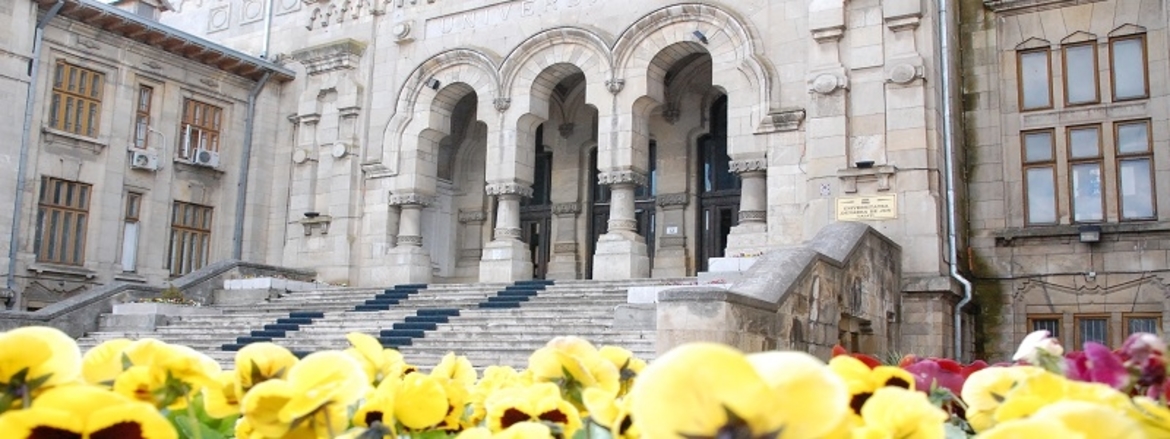 |
|
“Stiintei” Campus - Map Address : Str. Domneasca no. 111 |
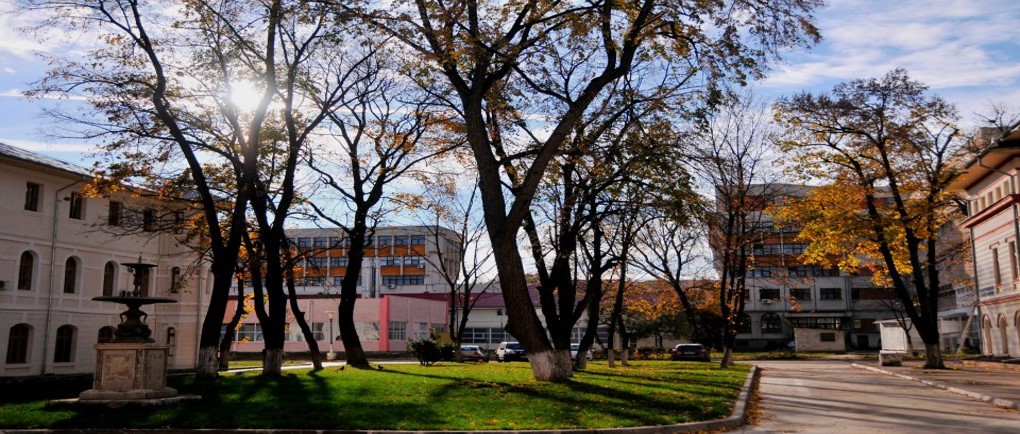 |
|
Faculty of Economics and Business Administration - Map Address: Str. Bălcescu no. 59 - 61 |
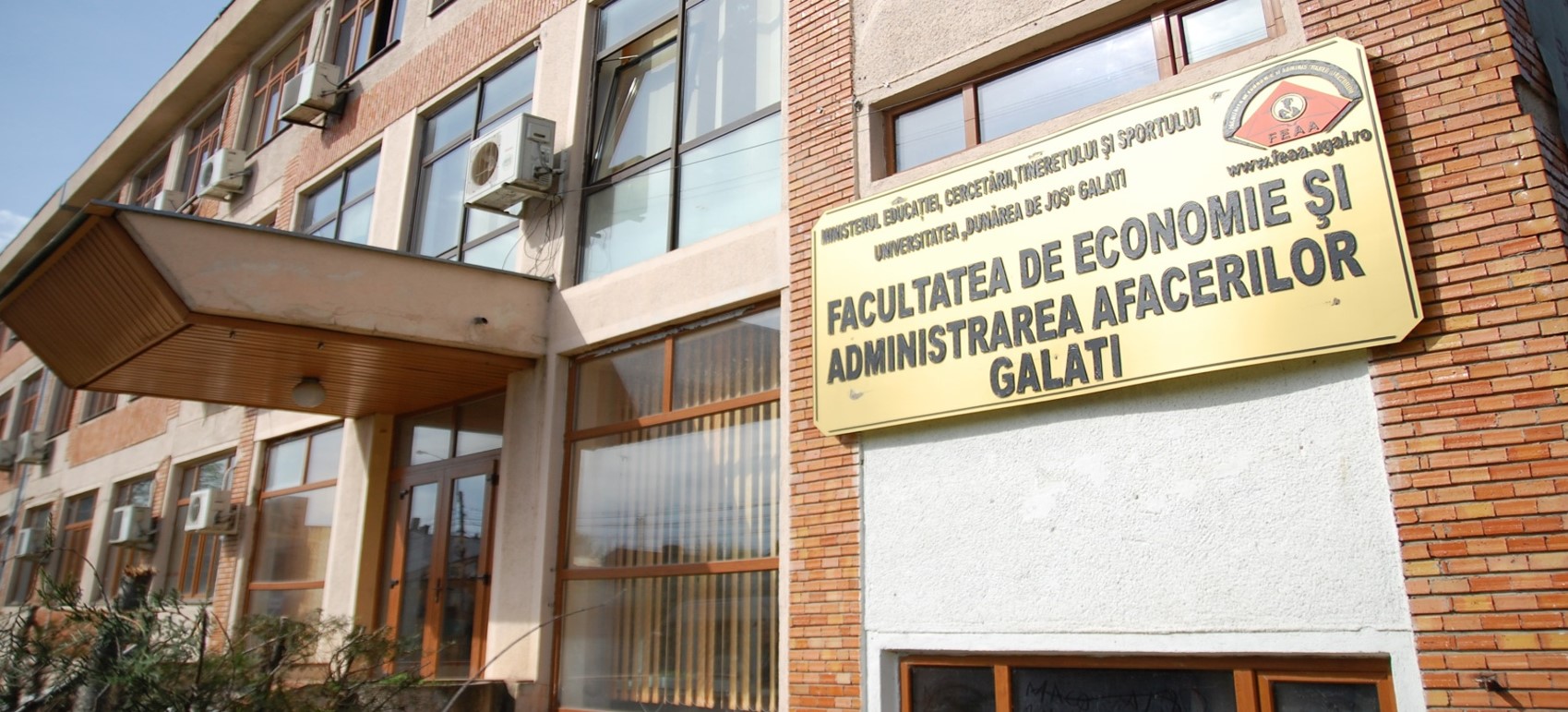 |
|
Faculty of Physical Education and Sports - Map Address: Str. Garii no. 63 – 65 |
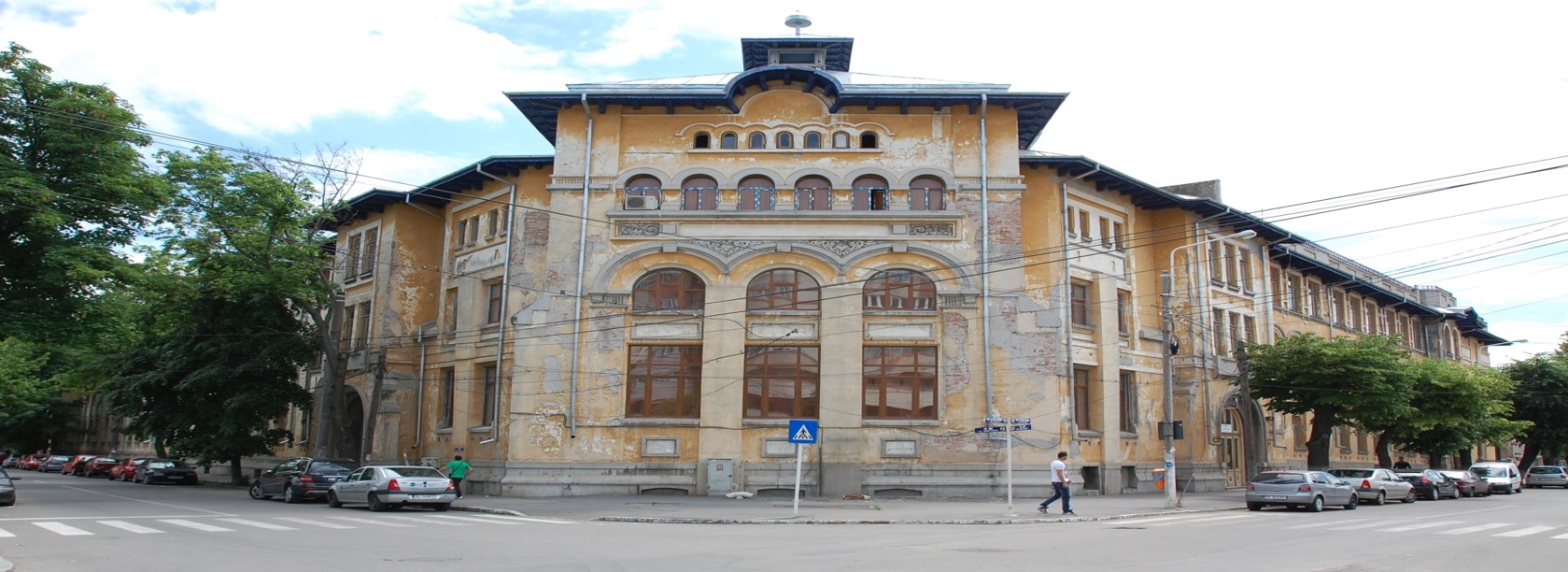 |
| Faculty of Medicine and Pharmacy - Map | ||
|
Dean’s office Address: Str. Al. I .Cuza no. 35 |
Building MG (CDT) Address: Str. Eroilor no. 34 |
Building MF Address: Blvd. Otelarilor no. 2 |
 |
||
|
“Al. I. Cuza” Campus – Map Address: Str. Parcului no. 4 (inside Student House Building F) |
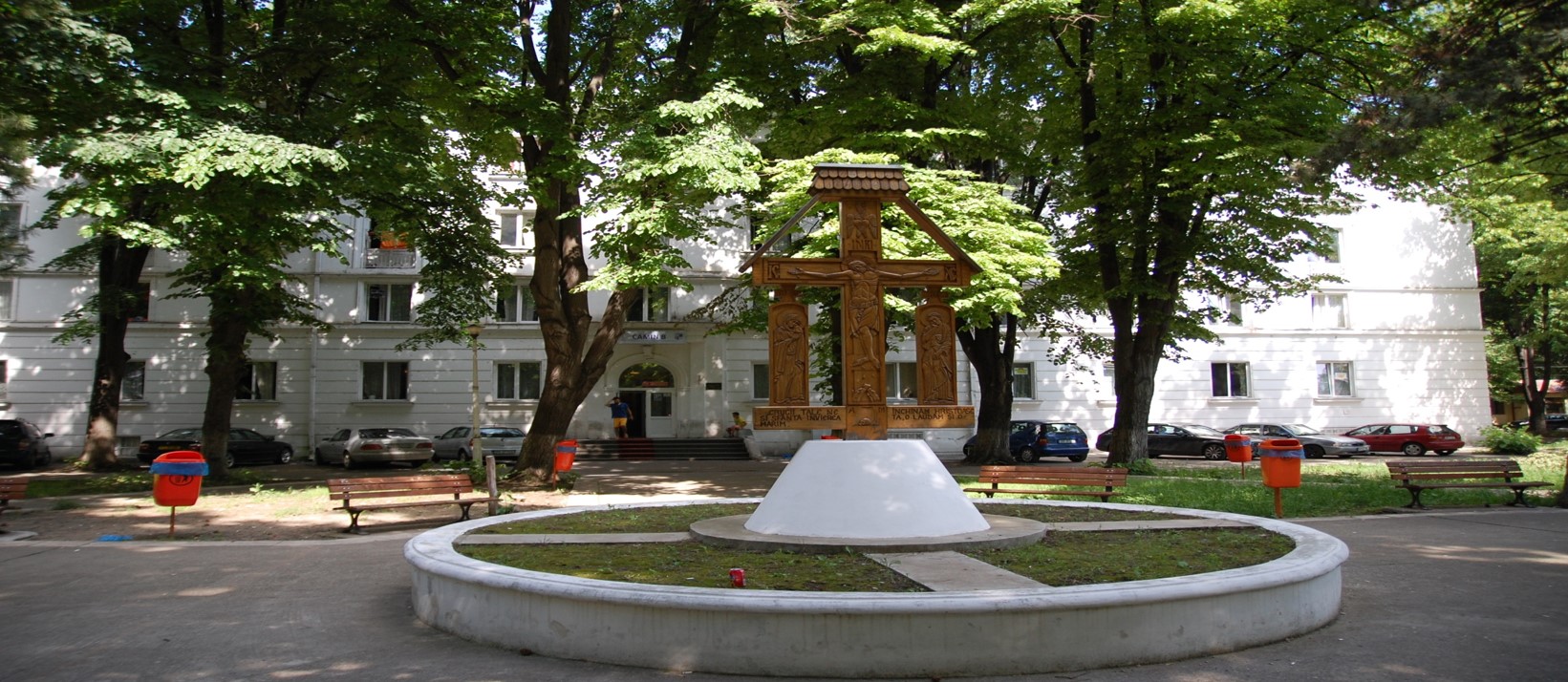 |
|
“22 Decembrie” Campus - Map Address: Str. Garii no. 59-61 |
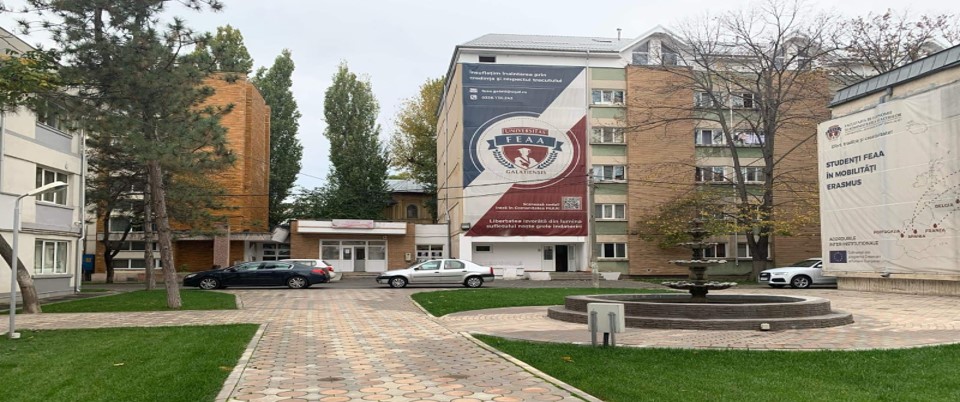 |
|
Faculty of Food Science and Engineering, Aquaculture Department Address: Str. Carnabel no. 61 |
|
Faculty of Engineering and Agronomy in Braila Address: Str. Călăraşilor no. 29 |
Subcategories
Факультеты
- Инженерный факультет
- Факультет военно-морской архитектуры
- Факультет пищевых наук и техники
- Факультет автоматики, вычислительной техники, электротехники и электроники
- Факультет физического воспитания и спорта
- Филологический факультет
- Факультет науки и окружающей среды
- Факультет истории, философии и теологии
- Факультет инженерии и агрономию в Брэила
- Факультет экономики и делового администрирования
- Факультета юридических, политических и социальных наук
- Факультет медицины и фармации
- Факультет искусств
- Трансграничныи факультет
- Расширение на факультете медицины и фармации в Энна-Италия
Внутренние ресурсы
Полезные ссылки
- Министерство национального образования и научных исследований
- Румынское агентство по обеспечению качества в сфере высшего образования
- Национальный совет по аттестации званий, дипломов и академических сертификатов
- Лига студентов Галац
- Дом студенческой культуры
- Окружная библиотека "V.A. Urechia" Галац
- Культурный центр Нижнего Дуная


